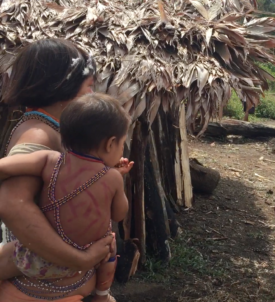
A study by Dominguez-Bello and colleagues found increases in microbiome diversity of urban children – but not urban adults – following immersion in the lifestyle of a Venezuelan rainforest village.
Photo: Maria Gloria Dominguez-Bello/Rutgers University–New Brunswick
The first Global Microbiome Network Symposium was launched by Rutgers University, Peruvian Universities Cayetano Heredia, and Universidad Catolica and the Microbiota Vault – a global non-profit initiative to conserve long-term health for humanity. The virtual symposium, held January 15-17, brought together local and foreign scientists that lead the fields of microbiology, anthropology, ethics, public health and bioinformatics, to teach, learn and discuss the importance of conservation efforts on microbial biodiversity. This is the first of a series of workshops that will help establish a global microbiome network.
With support from Rutgers Global, the event involved over 1,000 registered participants from 34 countries, with leading speakers from different universities addressing current knowledge and issues in the fields of microbial ecology, health, economics, law, ethics, and anthropology. Among the international panelists were Rutgers School of Environmental and Biological Sciences faculty María Gloria Domínguez-Bello, Henry Rutgers Professor of Microbiome and Health; Robert Goodman, University Professor, Distinguished Professor of Ecology, Evolution, and Natural Resources and former Executive Dean of Agriculture and Natural Resources; and Liping Zhao, professor and Eveleigh-Fenton Chair of Applied Microbiology. Also representing Rutgers was Martin J. Blaser, Henry Rutgers Chair of the Human Microbiome and director of the Center for Advanced Biotechnology and Medicine.
Microbial diversity, crucial for human health, is globally threatened by westernization and urbanization at an unprecedented pace. Microbial biodiversity hotspots are mostly located in places with traditional peoples and will be lost as they integrate in industrial societies, unless there is recognition of the urgent to preserve it, and foster research to understand the functions of the diversity at risk of being lost.
There is a clear association between industrialization/urbanization and the rocketing of immune and metabolic and immune malfunctions leading to diseases such as asthma, allergies, type 1 diabetes, celiac disease, etc. These microbes at risk of extinction will be needed in the future to reverse the worldwide trends of increasing chronic diseases.
Dominguez Bello – who is also director of the New Jersey Institute for Food, Nutrition and Health – said, “As part of a global initiative supported by Rutgers and the Microbiota Vault, Rutgers and Universities in Peru organized the first of a series of symposia to initiate the formation of a Global Microbiome Network, and we call this series GloMiNe. The idea is to work together to support efforts on education, creation of local collections, standardization of protocols and ethical considerations, and research.”
Rutgers received support from the Global health institute and Rutgers Global, for this first GloMiNe.
Read more about the Rutgers Microbiome Program as a project of Rutgers University Foundation’s Big Ideas.

